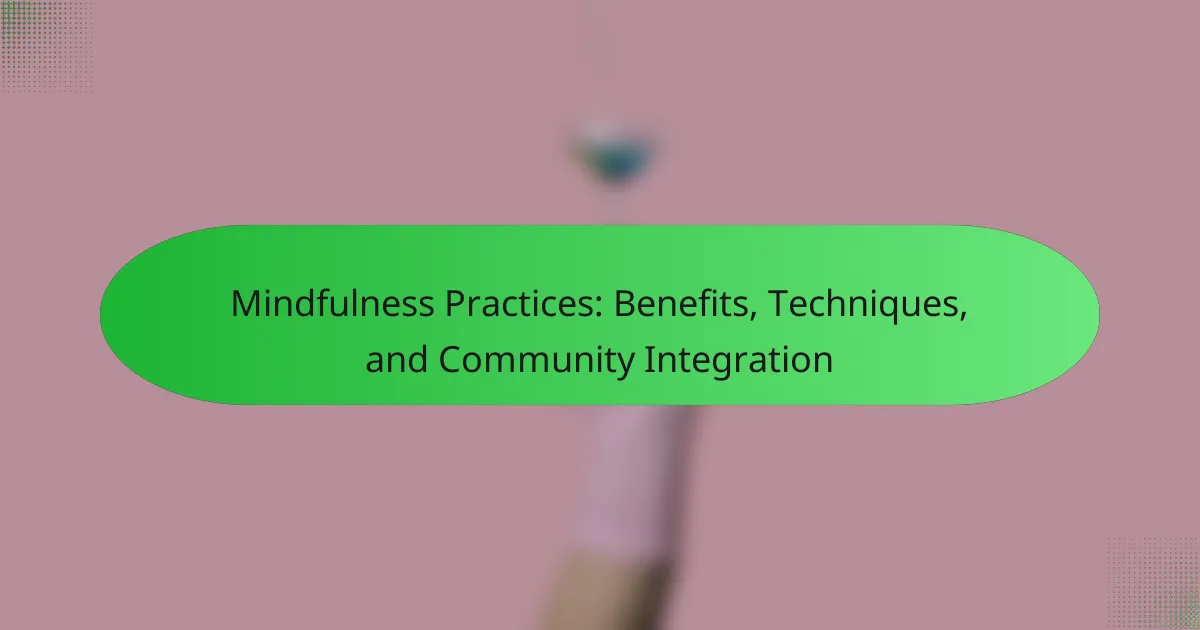Self-compassion is essential for enhancing mental well-being and resilience. It fosters a kinder self-dialogue, reduces anxiety, and improves emotional regulation. This article explores the importance of self-compassion, its numerous benefits for emotional health, practical exercises to cultivate it, and cultural variations in its practice. Understanding these aspects can empower individuals to navigate life’s challenges more effectively.
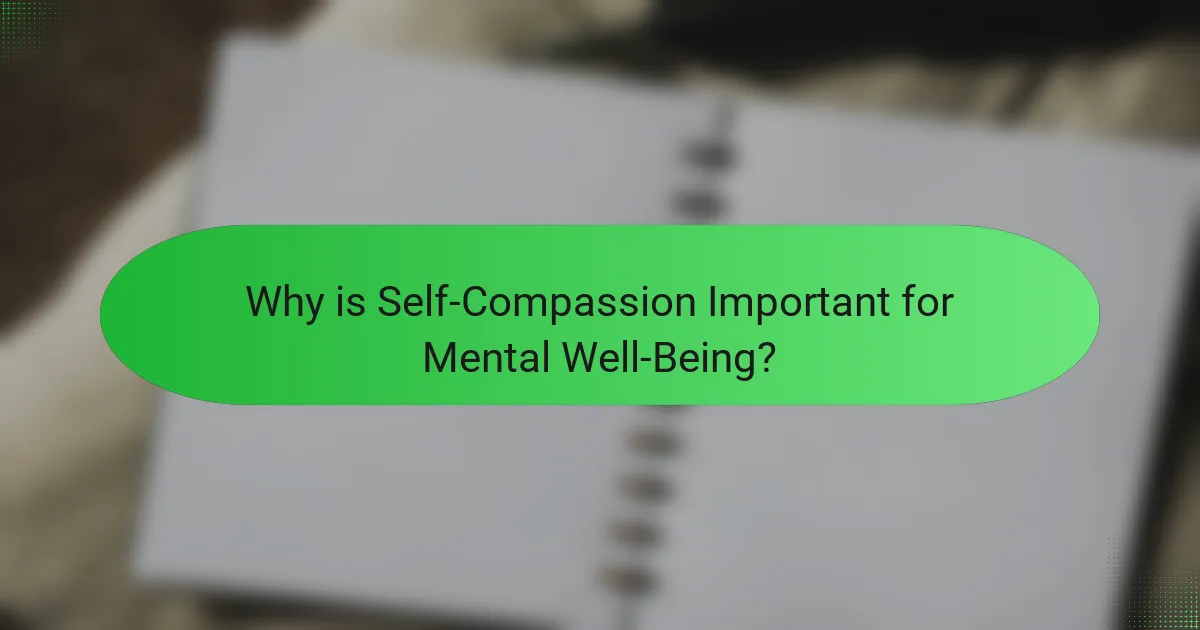
Why is Self-Compassion Important for Mental Well-Being?
Self-compassion is crucial for mental well-being as it fosters resilience and reduces anxiety. It encourages a kinder self-dialogue, leading to improved emotional regulation. Studies show that self-compassionate individuals experience less depression and greater life satisfaction. Practicing self-compassion through mindfulness and self-kindness can empower individuals to navigate challenges more effectively, enhancing overall mental health.
How Does Self-Compassion Impact Emotional Resilience?
Self-compassion significantly enhances emotional resilience by fostering a supportive inner dialogue. It encourages individuals to treat themselves with kindness during difficult times, reducing feelings of inadequacy and promoting a sense of belonging. Research shows that self-compassionate individuals exhibit lower levels of anxiety and depression, leading to improved mental health outcomes. Engaging in practical exercises, such as mindfulness and self-kindness practices, can further strengthen this resilience.
What Role Does Self-Compassion Play in Reducing Anxiety and Depression?
Self-compassion significantly reduces anxiety and depression by fostering emotional resilience. It encourages individuals to treat themselves with kindness during difficult times, promoting a healthier self-image. Research indicates that self-compassionate individuals experience lower levels of anxiety and depression due to their ability to manage negative emotions effectively. Practicing self-compassion involves acknowledging one’s struggles without harsh self-judgment, which can lead to improved mental well-being.

What Are the Key Benefits of Practicing Self-Compassion?
Practicing self-compassion offers numerous benefits that enhance emotional well-being. It fosters resilience, reduces anxiety, and promotes a healthier self-image. Self-compassion encourages individuals to treat themselves with kindness during difficult times, leading to improved mental health outcomes. Research indicates that self-compassionate individuals experience greater life satisfaction and lower levels of depression. Additionally, it cultivates a supportive inner dialogue, enhancing motivation and personal growth.
How Can Self-Compassion Enhance Personal Relationships?
Self-compassion enhances personal relationships by fostering empathy, understanding, and emotional resilience. This practice encourages individuals to treat themselves kindly, which translates into more compassionate interactions with others. Research shows that self-compassionate individuals are better at managing conflict and expressing their needs. They are also more likely to offer support and understanding to their partners, leading to stronger emotional bonds. Practicing self-compassion can improve communication skills and reduce anxiety, creating a healthier relational dynamic.
In What Ways Does Self-Compassion Foster Motivation and Achievement?
Self-compassion fosters motivation and achievement by promoting resilience and reducing fear of failure. It encourages a growth mindset, allowing individuals to embrace challenges and learn from mistakes. This supportive self-approach enhances emotional well-being, which boosts overall performance and persistence. Additionally, self-compassionate individuals set more realistic goals, leading to sustainable achievement.
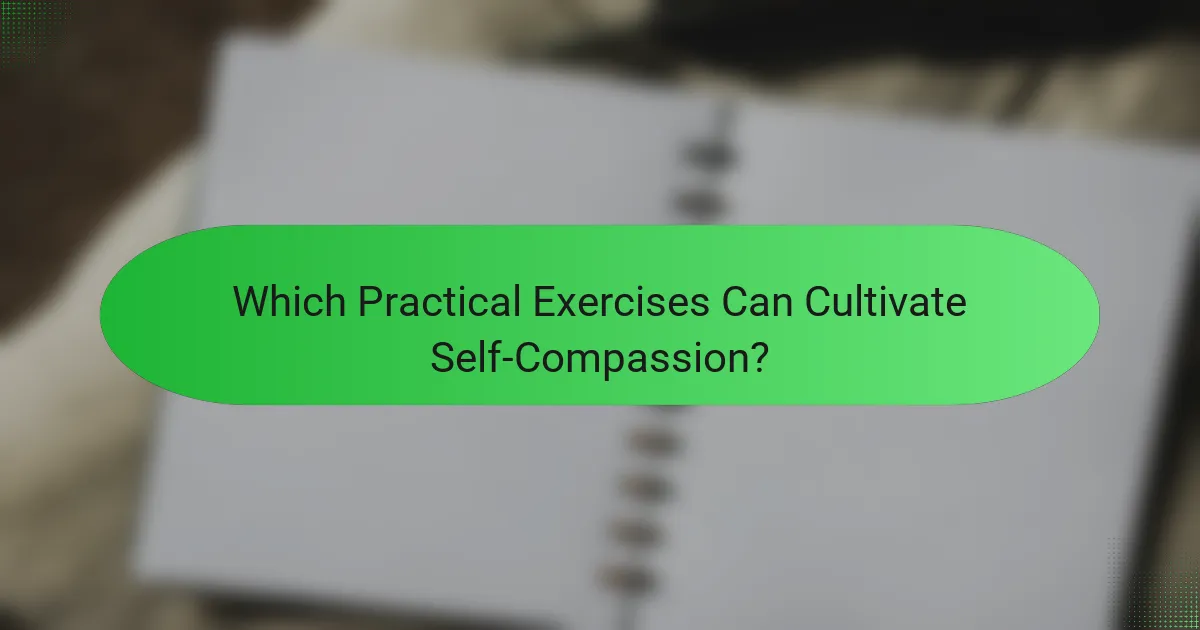
Which Practical Exercises Can Cultivate Self-Compassion?
Practicing self-compassion can be cultivated through several practical exercises. Mindfulness meditation encourages awareness of thoughts and feelings without judgment. Self-kindness involves treating oneself with the same care as a friend in distress. Writing a self-compassion letter allows individuals to express understanding and forgiveness towards themselves. Engaging in positive affirmations reinforces self-worth and acceptance. Finally, guided imagery can help visualize a compassionate response to personal struggles. These exercises enhance emotional resilience and promote overall well-being.
What Daily Practices Promote Self-Compassion in Everyday Life?
Daily practices that promote self-compassion include mindfulness, self-kindness, and recognizing shared humanity. Mindfulness helps individuals observe their thoughts without judgment. Self-kindness encourages treating oneself with care during difficult moments. Recognizing shared humanity fosters connection, reminding individuals they are not alone in their struggles. These practices enhance emotional resilience and overall well-being.
How Can Guided Meditations Support Self-Compassion Development?
Guided meditations effectively support self-compassion development by fostering mindfulness and emotional awareness. These practices help individuals cultivate kindness towards themselves, reducing self-criticism. Research shows that regular engagement in guided meditations can lead to increased emotional resilience and improved mental well-being. Techniques such as loving-kindness meditation specifically enhance feelings of compassion, encouraging a more positive self-image and greater acceptance of personal flaws.
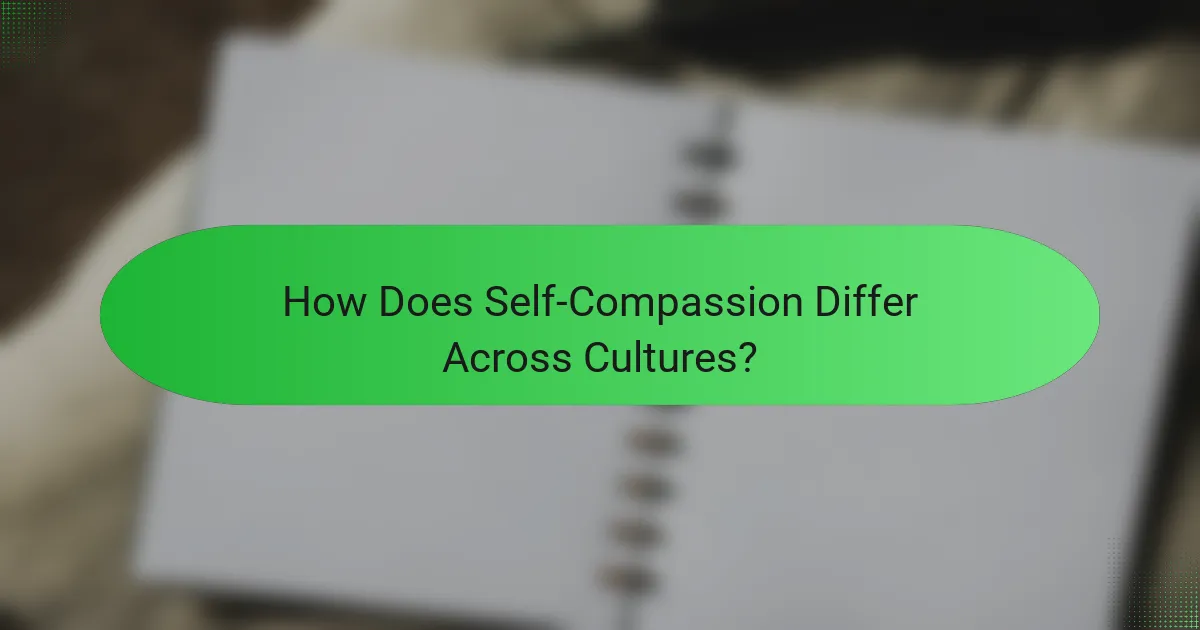
How Does Self-Compassion Differ Across Cultures?
Self-compassion varies significantly across cultures, influenced by social norms and values. In collectivist cultures, self-compassion often emphasizes community and relational harmony, while individualistic cultures focus on personal growth and self-acceptance. For example, research indicates that East Asian cultures may prioritize compassion towards others over self-kindness, leading to a unique expression of self-compassion that aligns with cultural expectations. As a result, understanding these cultural differences enhances the application of self-compassion practices globally.
What Unique Perspectives on Self-Compassion Exist in Eastern Philosophies?
Eastern philosophies offer unique perspectives on self-compassion, emphasizing interconnectedness and mindfulness. In Buddhism, self-compassion is viewed as essential for alleviating suffering, promoting loving-kindness towards oneself. Taoism encourages acceptance of one’s nature, fostering inner peace. Confucianism highlights the importance of self-reflection and moral integrity in cultivating compassion. These perspectives collectively enhance emotional resilience and personal growth.
How is Self-Compassion Perceived in Western Psychological Practices?
Self-compassion is increasingly recognized in Western psychological practices as essential for emotional well-being. It fosters resilience, reduces anxiety, and enhances overall mental health. Studies show that self-compassionate individuals report higher life satisfaction and lower levels of depression. Practical exercises, such as mindfulness and self-kindness, are commonly incorporated into therapeutic settings to empower individuals. These practices encourage a supportive inner dialogue, promoting healthier coping strategies and emotional regulation.
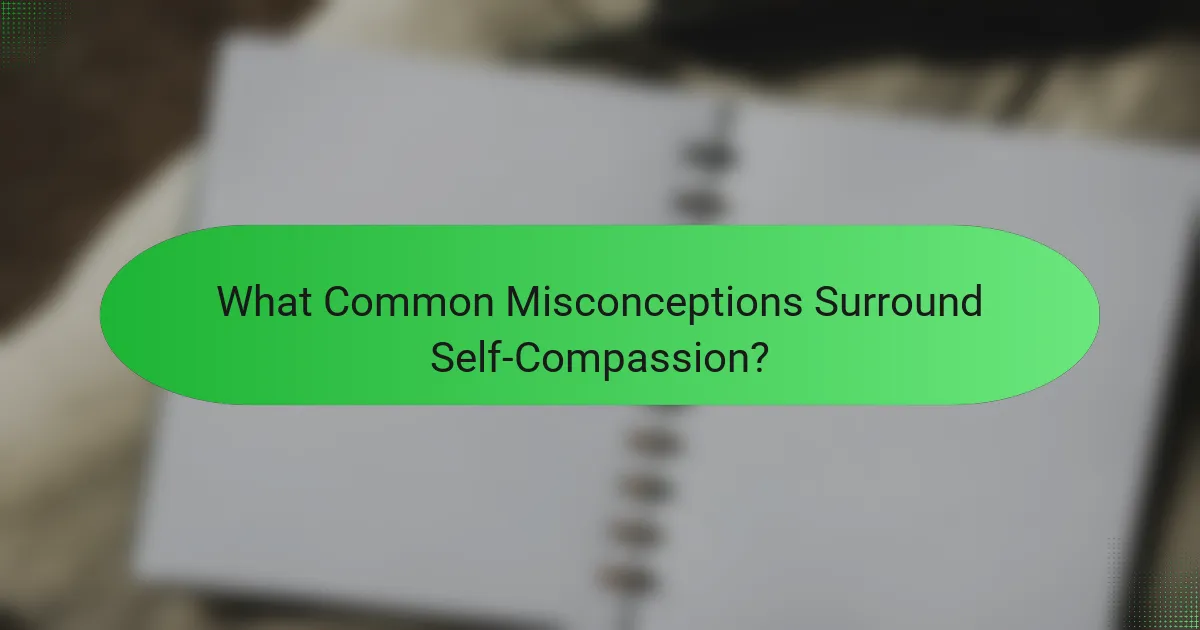
What Common Misconceptions Surround Self-Compassion?
Self-compassion is often misunderstood as self-indulgence or weakness. Many believe that being kind to oneself leads to complacency, but research shows it actually fosters resilience and motivation. Another misconception is that self-compassion is solely about self-pity; however, it encourages a balanced perspective on failures and struggles. Lastly, some think self-compassion is a one-time practice, but it requires ongoing effort and mindfulness to cultivate effectively.
Why Do Some People Confuse Self-Compassion with Self-Pity?
Self-compassion is often confused with self-pity because both involve self-reflection, but their outcomes differ significantly. Self-compassion fosters resilience and emotional growth, while self-pity can lead to stagnation and negativity.
Self-compassion encourages individuals to treat themselves with kindness during difficult times, promoting a sense of shared humanity. In contrast, self-pity often isolates individuals, making them feel like victims of their circumstances. This distinction is crucial for developing emotional intelligence and overall well-being.
Recognizing the difference can empower individuals to practice self-compassion effectively. Engaging in practical exercises, such as mindfulness and self-kindness, can strengthen this attribute. These practices enhance emotional resilience and promote a healthier self-view, moving away from the isolating effects of self-pity.
How Can Self-Compassion Coexist with High Standards and Accountability?
Self-compassion can coexist with high standards and accountability by fostering a supportive mindset. This approach allows individuals to pursue excellence while maintaining kindness towards themselves during setbacks. Embracing self-compassion promotes resilience, which is essential for meeting high expectations.
Research shows that self-compassionate individuals are more likely to achieve their goals, as they view failures as opportunities for growth rather than reflections of their worth. This perspective encourages accountability without harsh self-criticism.
Practical exercises, such as mindful self-reflection and positive affirmations, can enhance self-compassion. These practices help individuals balance their high standards with a nurturing attitude, ultimately leading to greater empowerment and success.
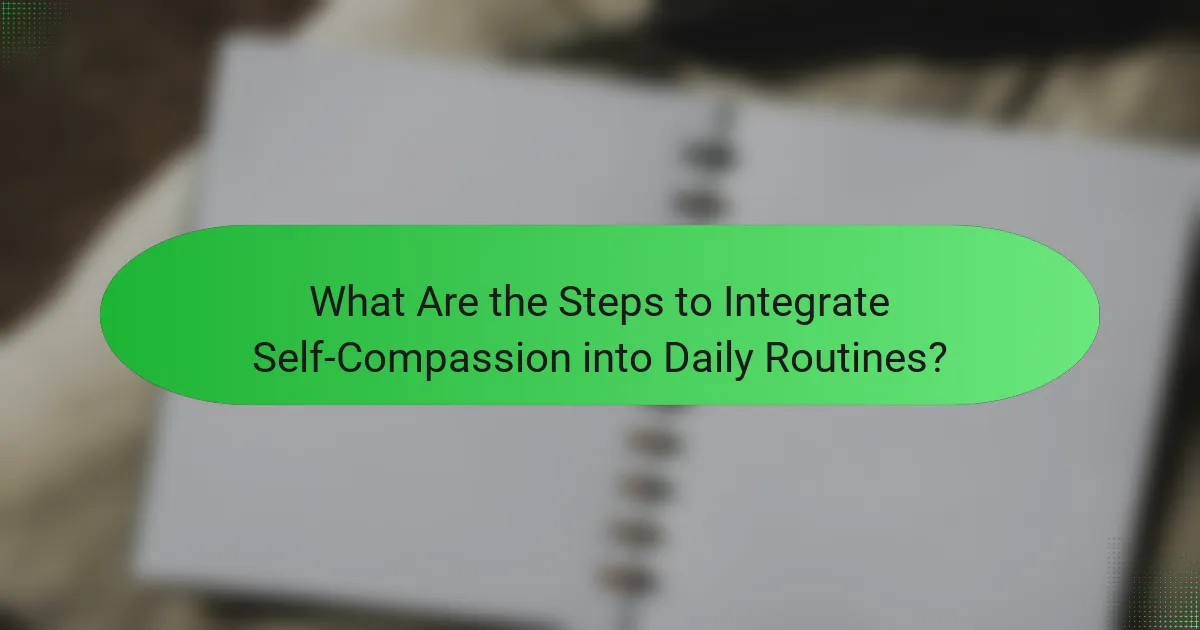
What Are the Steps to Integrate Self-Compassion into Daily Routines?
To integrate self-compassion into daily routines, follow these steps. Begin by practicing mindfulness to cultivate awareness of your thoughts and feelings. Next, engage in self-kindness by treating yourself with the same care you would offer a friend. Incorporate positive affirmations to counter negative self-talk. Finally, reflect on your experiences and learn from them, fostering a growth mindset.
How Can Journaling Foster a Habit of Self-Compassion?
Journaling fosters a habit of self-compassion by encouraging reflection and emotional awareness. It allows individuals to express feelings without judgment, promoting a kinder self-dialogue. Regular journaling can reveal patterns of negative self-talk, enabling constructive change. This practice enhances emotional resilience and supports mental well-being, making it a powerful tool for personal empowerment.
What Techniques Help Overcome Barriers to Self-Compassion?
Practicing mindfulness, reframing negative thoughts, and engaging in self-kindness are effective techniques to overcome barriers to self-compassion. Mindfulness helps individuals observe their feelings without judgment. Reframing allows for a more positive perspective on self-criticism. Self-kindness encourages treating oneself with the same care as a friend would. These methods foster a supportive inner dialogue, promoting emotional resilience and personal growth.
What Expert Tips Can Enhance the Practice of Self-Compassion?
Practicing self-compassion can be enhanced through several expert tips. First, cultivate mindfulness by acknowledging your feelings without judgment. Second, engage in positive self-talk, replacing critical thoughts with supportive affirmations. Third, practice self-kindness by treating yourself as you would a friend in distress. Fourth, maintain a balanced perspective by recognizing that imperfection is part of the human experience. Lastly, incorporate regular self-care activities that promote well-being, such as exercise or hobbies.


